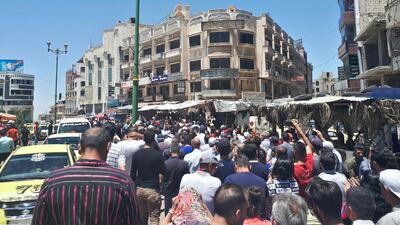The Syrian regime moved to crack down on a peaceful protest movement in Suweida, eight days after the outbreak of demonstrations against President Bashar Al Assad in the mostly Druze province.
A citizen journalists’ network said regime personnel broke up a peaceful demonstration – fuelled by the sharp deterioration in the economy – in a central square in Suweida city on Sunday and arrested seven people in the first direct action against the mostly young demonstrators.
Suwayda24, which has been documenting civil disobedience in the area, said secret police and Baath Brigades militiamen were among the loyalist forces who attacked the demonstrators with sticks.
Photos by the network showed demonstrators at a main square carrying a banner directed at the president that read: “Leave. We want a civilian, secular state that unites all Syrians and treats them equally.”
Other photos show one security personnel carrying an AK-47 next to another uniformed enforcer grabbing a man by his hair. Other loyalists in military fatigue are also among the crowd.
Suweida has been a barometer of how would the regime would deal with mass discontent since the currency renewed steep falls, trading at over 3,000 Syrian pounds to the dollar at the beginning of this month.
The exchange rate hovered around 50 pounds to the dollar at the outbreak of the 2011 revolt against Assad family rule.
Among the factors contributing to the collapse of the Syrian pound, according to regional bankers, are the printing of money by the authorities, a financial meltdown in Lebanon at the end of last year and a US legislation containing sanctions against the regime that is due to come into effect on Wednesday.

While unconfirmed reports emerged this month of people in regime areas expressing rare public displeasure with Mr Al Assad, Suweida became the first governorate the regime considers loyalist with sustained public dissent.
The Alawite-dominated regime markets itself as the protector of fellow minorities, which has hampered the regime’s natural instinct for the last five decades to strike with an iron fist at any sign of dissent.
The authorities mounted a counter rally in Suweida last week in support of the president.
Noura Basha, a citizen journalist in Suweida, told The National that only a limited number of people showed up, despite the regime's use of coercion to force Suweida's inhabitants to attend.
“They threatened public workers will be fired and students will be dismissed. But only 1,000 people or so showed up,” she said.
Later in the week, Mr Al Assad replaced his prime minister – a powerless position in a system underpinned by the security apparatus.
The new prime minister, Hussein Arnous, pledged on Saturday to reverse currency falls the regime blames on “speculators”.
The pound has improved over the last week as the regime channelled dollars into the market. But on Sunday the pound was trading in Damascus at 2,500 to the dollar, compared with 2,275 the day before, data by currency monitor The Syrian Pound Today showed.
A regional banker in Dubai said that Mr Al Assad “will learn the hard way that he cannot control an economy like he controls his opponents.”
The rule of the Assads began in 1970 when Hafez Al Assad, then the defence minister, took power in a coup from another Alawite officer, who had survived an earlier coup by a Druze officer, largely because Hafez Al Assad denied the Druze officer support.


